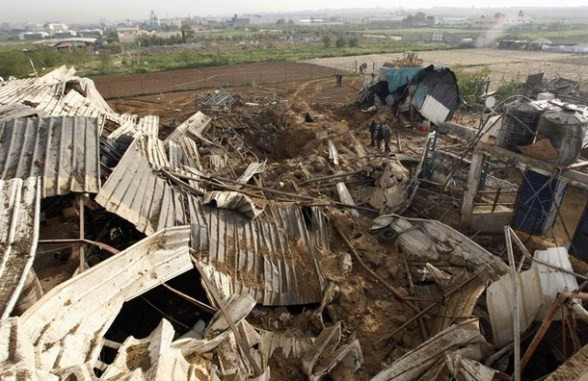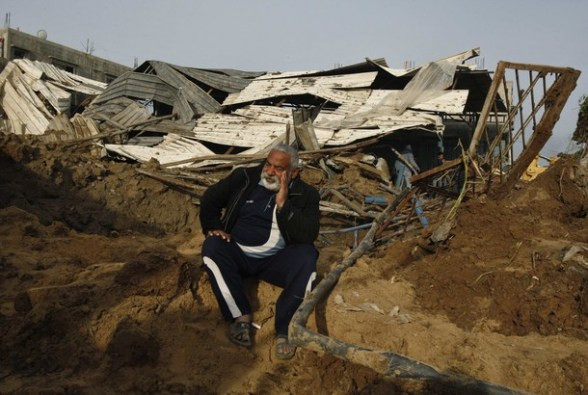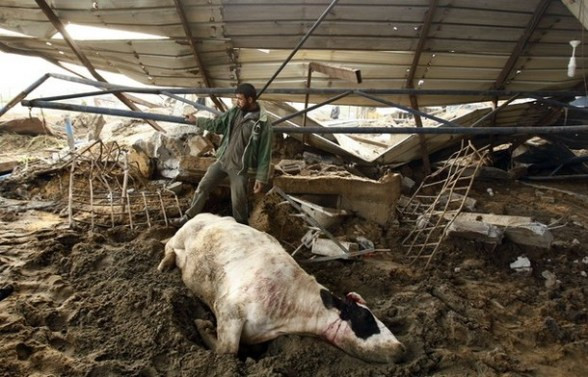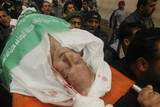19 feb 2012

The chilling tale of a Palestinian car thief released from hospital prematurely and placed in police detention.
An unspeakable act took place in Israel. Late one night, an officer of the Israel Police tossed one Omar Abu Jariban - injured, confused and shoeless - to the side of the road and left him there to die.
This chilling story, which took place in the summer of 2008, was reported by Chaim Levinson in Friday's Hebrew edition of Haaretz. The incident should keep many Israelis awake at night. Serious measures must be taken against all those responsible.
Abu Jariban - who lives in the Gaza Strip city of Rafah, and who was not authorized to enter Israel - was seriously injured in an accident while riding with a friend in a stolen car. He was discharged from Sheba Medical Center, Tel Hashomer - with a urinary catheter still in place, still using adult diapers, and in need of further medical care and rehabilitation - and he was placed in police detention. Hospital and police officials are now trading accusations over who was responsible for his premature and unconscionable discharge from Sheba.
Following failed efforts by the Rehovot and Kfar Sava police stations to identify Abu Jariban, police officials made the decision to get rid of the injured, sick and confused detainee and to take him to the Maccabim border crossing. Three police officers pushed him into a police vehicle. After it reached the checkpoint, whose commander refused to take the injured man, he was thrown from the vehicle in the dark of night onto the shoulder of Route 45, between the Ofer Base and the Atarot border crossing. He was wearing only hospital pajamas and was still attached to the catheter. His body was discovered two days later. "He was simply thrown to the dogs," Abu Jariban's brother, Mohammed, said by telephone from Gaza. The brother, horrifically, related the events in precise detail.
In March 2009, after an investigation by the Justice Ministry's department for the investigation of police officers, it was decided that only two of the officers involved in dumping and abandoning Abu Jariban by the side of the road would be prosecuted, both on charges of criminally negligent homicide. The evidentiary stage of the trial has not yet begun, but one of the defendants has since been promoted within the police. A third officer, who was given a disciplinary trial over the incident, has also been promoted since then.
There are individuals who are responsible for this horrific act, and they must pay for their deeds. It is not sufficient to settle for the very partial recommendations of the police investigations department. The attorney general must order an additional and more comprehensive investigation of the conduct of Sheba and of the police in this incident.
An unspeakable act took place in Israel. Late one night, an officer of the Israel Police tossed one Omar Abu Jariban - injured, confused and shoeless - to the side of the road and left him there to die.
This chilling story, which took place in the summer of 2008, was reported by Chaim Levinson in Friday's Hebrew edition of Haaretz. The incident should keep many Israelis awake at night. Serious measures must be taken against all those responsible.
Abu Jariban - who lives in the Gaza Strip city of Rafah, and who was not authorized to enter Israel - was seriously injured in an accident while riding with a friend in a stolen car. He was discharged from Sheba Medical Center, Tel Hashomer - with a urinary catheter still in place, still using adult diapers, and in need of further medical care and rehabilitation - and he was placed in police detention. Hospital and police officials are now trading accusations over who was responsible for his premature and unconscionable discharge from Sheba.
Following failed efforts by the Rehovot and Kfar Sava police stations to identify Abu Jariban, police officials made the decision to get rid of the injured, sick and confused detainee and to take him to the Maccabim border crossing. Three police officers pushed him into a police vehicle. After it reached the checkpoint, whose commander refused to take the injured man, he was thrown from the vehicle in the dark of night onto the shoulder of Route 45, between the Ofer Base and the Atarot border crossing. He was wearing only hospital pajamas and was still attached to the catheter. His body was discovered two days later. "He was simply thrown to the dogs," Abu Jariban's brother, Mohammed, said by telephone from Gaza. The brother, horrifically, related the events in precise detail.
In March 2009, after an investigation by the Justice Ministry's department for the investigation of police officers, it was decided that only two of the officers involved in dumping and abandoning Abu Jariban by the side of the road would be prosecuted, both on charges of criminally negligent homicide. The evidentiary stage of the trial has not yet begun, but one of the defendants has since been promoted within the police. A third officer, who was given a disciplinary trial over the incident, has also been promoted since then.
There are individuals who are responsible for this horrific act, and they must pay for their deeds. It is not sufficient to settle for the very partial recommendations of the police investigations department. The attorney general must order an additional and more comprehensive investigation of the conduct of Sheba and of the police in this incident.
16 feb 2012
Former Prisoner’s Wife Miscarried as IOF Stormed Her House in Salem Village near Nablus
The Palestinian Centre for Human Rights (PCHR) condemns crimes of harassment and intimidation committed by Israeli Occupation Forces (IOF) during nightly house raids in the West Bank, during which allegedly wanted Palestinians are arrested or summoned for interrogation by the Israeli General Security Service (Shabak).
The house raids in the period between 9 and 15 February 2012, numbering 72 in total, resulted in the miscarriage of the wife of a former prisoner in Israeli jails in Salem village, east of Nablus.
According to PCHR investigations and the woman’s testimony, at approximately 02:00 on Saturday, 11 February 2012, IOF moved into Salem village, east of Nablus.
They raided a house belonging to the family of Nassim Helmi Karkari, 40, a former prisoner in Israeli jails who was released in the latest prisoner swap between Israel and Palestinian resistance groups. Karkari’s mother opened the door, and Israeli soldiers entered the house.
They ordered her to bring her son. She went to her son’s flat to inform him. Quickly, Karkadi and his wife, Sameera Fu’ad Eshtayeh, 37, who was pregnant in the second month, came down from their flat on the second floor. The soldiers requested Karkari’s ID card, and ordered his wife to bring it.
She mounted up very fast on the stairs. While she was descending on the stairs, she tripped and fell down. She then gave the ID card to Israeli soldiers, who verified it and delivered Karkari a notice to refer to the Shabak in Huwara military camp on 13 February 2012.
A few hours after IOF had left the house, the wife suffered from severe pains in the abdomen and the back. She immediately went to her gynecologist, Hanan Aadel, in Nablus.
The gynecologist asked Eshtayeh for an ultrasound scan, and when she checked the scan, she told her that the fetus had no pulses. Eshtayeh was transferred to Rafidya Hospital, where she was aborted.
PCHR emphasizes that IOF practice systematic intimidation and harassment against Palestinian civilians during nightly house raids, and:
1. Strongly condemns the intimidation of Nassim Karkari’s family, which caused his wife’s miscarriage;
2. Stresses that intimation and harassment of civilians constitute a form of torture and cruel and inhuman treatment; and
3. Reiterates its call for the international community to immediately act to stop Israel’s systematic and serious human rights violations against Palestinian civilians.
Former Prisoner’s Wife Miscarried as IOF Stormed Her House in Salem Village near Nablus
The Palestinian Centre for Human Rights (PCHR) condemns crimes of harassment and intimidation committed by Israeli Occupation Forces (IOF) during nightly house raids in the West Bank, during which allegedly wanted Palestinians are arrested or summoned for interrogation by the Israeli General Security Service (Shabak).
The house raids in the period between 9 and 15 February 2012, numbering 72 in total, resulted in the miscarriage of the wife of a former prisoner in Israeli jails in Salem village, east of Nablus.
According to PCHR investigations and the woman’s testimony, at approximately 02:00 on Saturday, 11 February 2012, IOF moved into Salem village, east of Nablus.
They raided a house belonging to the family of Nassim Helmi Karkari, 40, a former prisoner in Israeli jails who was released in the latest prisoner swap between Israel and Palestinian resistance groups. Karkari’s mother opened the door, and Israeli soldiers entered the house.
They ordered her to bring her son. She went to her son’s flat to inform him. Quickly, Karkadi and his wife, Sameera Fu’ad Eshtayeh, 37, who was pregnant in the second month, came down from their flat on the second floor. The soldiers requested Karkari’s ID card, and ordered his wife to bring it.
She mounted up very fast on the stairs. While she was descending on the stairs, she tripped and fell down. She then gave the ID card to Israeli soldiers, who verified it and delivered Karkari a notice to refer to the Shabak in Huwara military camp on 13 February 2012.
A few hours after IOF had left the house, the wife suffered from severe pains in the abdomen and the back. She immediately went to her gynecologist, Hanan Aadel, in Nablus.
The gynecologist asked Eshtayeh for an ultrasound scan, and when she checked the scan, she told her that the fetus had no pulses. Eshtayeh was transferred to Rafidya Hospital, where she was aborted.
PCHR emphasizes that IOF practice systematic intimidation and harassment against Palestinian civilians during nightly house raids, and:
1. Strongly condemns the intimidation of Nassim Karkari’s family, which caused his wife’s miscarriage;
2. Stresses that intimation and harassment of civilians constitute a form of torture and cruel and inhuman treatment; and
3. Reiterates its call for the international community to immediately act to stop Israel’s systematic and serious human rights violations against Palestinian civilians.
15 feb 2012
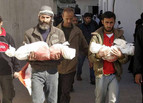
Hamas fighters killed
Israel's ambassador to the UN, Ron Prosor, said Tuesday that Syria's president was "systematically murdering civilians" amid the uprising that began 10 months ago.
Addressing a General Assembly session on Syria, Prosor said that "It is time for the international community to stop standing on the sidelines watching murder after murder."
Prosor added: "It should be obvious that Assad and his regime have no moral authority to govern. And it is high time for this organization to start doing something meaningful to stop him from killing his own people."
Israel's ambassador to the UN, Ron Prosor, said Tuesday that Syria's president was "systematically murdering civilians" amid the uprising that began 10 months ago.
Addressing a General Assembly session on Syria, Prosor said that "It is time for the international community to stop standing on the sidelines watching murder after murder."
Prosor added: "It should be obvious that Assad and his regime have no moral authority to govern. And it is high time for this organization to start doing something meaningful to stop him from killing his own people."
12 feb 2012
Israeli Air Forces Kill Palestinian, Raid Gaza Neighborhoods
Israeli Aircrafts Strike Four Gaza Targets
Israeli aircrafts attacked four targets in the Gaza Strip on Saturday night, in response to a Qassam rocket that was fired from Gaza a few hours earlier at the Eskol Council area, according to (The Jerusalem Post).
The Israeli occupation forces reported that it accurately hit four targets along the Strip, while Palestinian media reported that at least two people were injured in the attack.
The Israeli occupation forces said that it hit a tunnel in southern Gaza, a tunnel in the center and a third tunnel and weapons manufacturing site in the North.
Israeli aircrafts attacked four targets in the Gaza Strip on Saturday night, in response to a Qassam rocket that was fired from Gaza a few hours earlier at the Eskol Council area, according to (The Jerusalem Post).
The Israeli occupation forces reported that it accurately hit four targets along the Strip, while Palestinian media reported that at least two people were injured in the attack.
The Israeli occupation forces said that it hit a tunnel in southern Gaza, a tunnel in the center and a third tunnel and weapons manufacturing site in the North.
1 feb 2012
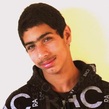
Yousef Ikhlayl 17, Killed by Settlers 29 jan 2011
Israeli forces on Tuesday fired tear gas and sound grenades at a memorial march in Beit Ummar near Hebron.
Residents of Beit Ummar held the march to mark the first anniversary of the death of local teenager Yousef Ikhleil, who was shot dead by Jewish settlers.
The march was organized by the local popular committee, which demanded Ikheil's killer be brought to justice.
Israeli soldiers fired tear gas and sound bombs and attacked marchers with rifle butts, witnesses said.
An Israeli military spokeswoman said around 40 people "rioted" in Beit Ummar and threw stones at soldiers. Forces responded with tear gas and a stun grenade, she said.
Israeli forces on Tuesday fired tear gas and sound grenades at a memorial march in Beit Ummar near Hebron.
Residents of Beit Ummar held the march to mark the first anniversary of the death of local teenager Yousef Ikhleil, who was shot dead by Jewish settlers.
The march was organized by the local popular committee, which demanded Ikheil's killer be brought to justice.
Israeli soldiers fired tear gas and sound bombs and attacked marchers with rifle butts, witnesses said.
An Israeli military spokeswoman said around 40 people "rioted" in Beit Ummar and threw stones at soldiers. Forces responded with tear gas and a stun grenade, she said.
24 jan 2012

Hamid Ahmad Sahloul 42
A Gaza man wounded by Israeli fire a decade ago has died of complications from his injuries, his family told Ma'an.
Hamid Ahmad Sahloul, 42, from Khan Younis refugee camp, was injured by shrapnel from an Israeli missile which killed and injured several people in 2002, relatives said.
Sahloul suffered severe injuries, and was treated in several hospitals in the Gaza Strip and abroad.
A Gaza man wounded by Israeli fire a decade ago has died of complications from his injuries, his family told Ma'an.
Hamid Ahmad Sahloul, 42, from Khan Younis refugee camp, was injured by shrapnel from an Israeli missile which killed and injured several people in 2002, relatives said.
Sahloul suffered severe injuries, and was treated in several hospitals in the Gaza Strip and abroad.
22 jan 2012

Hanin Kamal Abu Jalala, 16
Palestinian medical sources reported Sunday that Hanin Kamal Abu Jalala, 16, died of wounds suffered during the Israeli offensive on Gaza three years ago. The child was severely wounded by phosphorous shells fired by the Israeli army into civilian areas in Gaza.
Abu Jalala lived with her family in Al-Boreij refugee camp, in the central Gaza Strip. Her injury also resulted in lung fibrosis.
She was hospitalized at the Hadassah Israeli hospital, and fell into coma nearly twelve days ago after undergoing surgery.
Her father, Kamal Abu Jalala, told the Safa News Agency that the administration at the Hadassah hospital is responsible for his daughter’s health, and added that the administration is refusing to grant him a photocopy of her medical file.
Her body will be moved from Hadassah to the Al Maqassed Islamic Hospital in East Jerusalem, before she is moved back to the Gaza Strip.
During the three-week war on Gaza, starting December 27, 2008, Israeli troops bombarded civilian areas and used phosphorous shells in direct violation of International law.
1419 Palestinians were killed during the war, and thousands were injured; dozens died of their wounds.
The majority of the casualties were civilians, including infants, children, women and elderly, medics and journalists.
The army also bombarded infrastructure, medical facilities, educational facilities, UNRWA facilities and civilian homes and structures.
Palestinian medical sources reported Sunday that Hanin Kamal Abu Jalala, 16, died of wounds suffered during the Israeli offensive on Gaza three years ago. The child was severely wounded by phosphorous shells fired by the Israeli army into civilian areas in Gaza.
Abu Jalala lived with her family in Al-Boreij refugee camp, in the central Gaza Strip. Her injury also resulted in lung fibrosis.
She was hospitalized at the Hadassah Israeli hospital, and fell into coma nearly twelve days ago after undergoing surgery.
Her father, Kamal Abu Jalala, told the Safa News Agency that the administration at the Hadassah hospital is responsible for his daughter’s health, and added that the administration is refusing to grant him a photocopy of her medical file.
Her body will be moved from Hadassah to the Al Maqassed Islamic Hospital in East Jerusalem, before she is moved back to the Gaza Strip.
During the three-week war on Gaza, starting December 27, 2008, Israeli troops bombarded civilian areas and used phosphorous shells in direct violation of International law.
1419 Palestinians were killed during the war, and thousands were injured; dozens died of their wounds.
The majority of the casualties were civilians, including infants, children, women and elderly, medics and journalists.
The army also bombarded infrastructure, medical facilities, educational facilities, UNRWA facilities and civilian homes and structures.
|
|
Text messages on a cell phone, some medicine and respiration equipment were all that remained after Haneen Abu Jalala, a 17-year-old girl from al-Bureij refugee camp in Gaza, died last month at an Israeli hospital.
“Dad, please save me from this torture.” “Dad, you are the greatest dad on earth.” These were some of the texts that Haneen typed before she perished from respiratory complications she had sustained following Operation Cast Lead, Israel’s war on Gaza in December 2008 and January 2009. Her family suspects that exposure to white phosphorous is the cause of her ailments and eventual death. |
Haneen died on 22 January at Hadassah Medical Center in Israel after she had entered a coma. Haneen had to leave school three years ago after she began to have breathing difficulties and her entire body turned blue.
“No more smiles”
Kamal Abu Jalala, Haneen’s father, and some of his eleven children were gathered along with various relatives inside Haneen’s now empty room in the family’s home.
“No more smiles, no more sounds, no more chatting and no more Haneen in Haneen’s room now,” said Umm Hamza, Haneen’s sister, her eyes welling with tears.
“Despite her severe health problems that complicated her life, she was filled with optimism and energy. She used to take me as her own twin sister, as she used to tell me about her ambitions, dreams and determination to live, saying she was very hopeful that she would return back to school to pursue her education,” her sister added.
Another of Haneen’s sisters, Ahlam, said, “May God take revenge on those who caused the death of my poor sister Haneen.”
“In spite of her sickness and suffering, Haneen used to fill our home with joy through her broad smile, her utter optimism and cheerfulness,” Ahlam added.
“I recall one day I felt sick, Haneen kept crying and prayed for me to recover to the extent that she helped me type some of my research papers [for a university degree] on the computer. Not because she is my sister, she was really like an angel and, God willing, she will go to paradise peacefully as a martyr,” she said.
Ahmad, Haneen’s twenty-year-old brother, said, “I am a construction worker and earn little, but every day when I returned back from my work, I used to bring her some cookies, potato chips and chocolate. All I wanted was to let her feel comfortable. Haneen was really a very tender girl.”
Haneen’s mother, Umm al-Abed, has been especially distraught following her daughter’s death and has found it hard to speak to visitors.
“Since Haneen’s death, Umm al-Abed has been continuously crying and unable to eat or drink properly,” Kamal said.
Lengthy treatment
Kamal talked of the lengthy treatment his daughter underwent, shedding tears he spoke.
“When Haneen began to have respiratory problems a few weeks after the Israeli war on Gaza came to an end in January 2009, I realized that my daughter needed medication, so I decided first and foremost to see local doctors,” Kamal recalled.
“The local doctors diagnosed her with a respiratory infection and they prescribed some medicines along with respiratory treatment sessions inside the hospital. As my daughter’s case deteriorated, I moved her to our home, so that we took care of her instead.”
Kamal suspects that white phosphorous, fired by the Israeli military at the rooftop of his house, ultimately caused Haneen’s death.
Holding a small picture of his deceased daughter, he said, “I recall well that one day during the war, Israeli occupation forces shelled the area with weapons that we hadn’t seen before. On the rooftop of my house, myself and the children, including Haneen, saw some flashing bodies. Suddenly smoke filled the place and Haneen began to cough and feel suffocated. At a nearby hospital, she was treated and returned back home.”
Haneen went on to receive treatment in Egypt and Israel.
A month in Egypt
In Egypt, Haneen received medical care for one month at the Nasser Institute in Cairo. Kamal, who accompanied his ailing daughter, was told by the hospital that Haneen was suffering from some sort of respiratory infection and that with the help of certain treatment, she would begin to recover.
“At the hospital, I tried relentlessly to find exactly what was the cause of my daughter’s health condition, but in vain. The only thing doctors told me was that Haneen was suffering from some respiratory infection, no more. We returned back to Gaza and her case deteriorated again.”
After contacting the Palestinian Authority’s health ministry in the West Bank city of Ramallah, Kamal, who was jailed for two and a half years by Israel in the 1980s, managed to transfer his daughter to an Israeli hospital.
Strange symptoms
“The ten-minute-long operation took exactly three hours and 35 minutes instead … Afterwards, she was placed at the intensive care unit, where new strange symptoms appeared on her. She was getting swelling, while I was not able to do anything for her.”
Kamal added that as his daughter’s case worsened and her kidney stopped functioning, he asked doctors at the hospital about what exactly his daughter was suffering from.
“I wanted to learn what was going on but doctors at the hospital revealed nothing to me, saying that it was not dangerous and that Haneen would recover soon. They also took a second sample from her lung and sent it to the US for testing, they told me. When I asked about the test’s result, they told me nothing until Haneen passed away on her hospital bed,” Kamal said angrily.
The Abu Jalala family have no answers for what happened to their daughter, just a few text messages reminding them of the young life that ended too soon.
Rami Almeghari is a journalist and university lecturer based in the Gaza Strip.
Most images by Shadi Alqarra.
“No more smiles”
Kamal Abu Jalala, Haneen’s father, and some of his eleven children were gathered along with various relatives inside Haneen’s now empty room in the family’s home.
“No more smiles, no more sounds, no more chatting and no more Haneen in Haneen’s room now,” said Umm Hamza, Haneen’s sister, her eyes welling with tears.
“Despite her severe health problems that complicated her life, she was filled with optimism and energy. She used to take me as her own twin sister, as she used to tell me about her ambitions, dreams and determination to live, saying she was very hopeful that she would return back to school to pursue her education,” her sister added.
Another of Haneen’s sisters, Ahlam, said, “May God take revenge on those who caused the death of my poor sister Haneen.”
“In spite of her sickness and suffering, Haneen used to fill our home with joy through her broad smile, her utter optimism and cheerfulness,” Ahlam added.
“I recall one day I felt sick, Haneen kept crying and prayed for me to recover to the extent that she helped me type some of my research papers [for a university degree] on the computer. Not because she is my sister, she was really like an angel and, God willing, she will go to paradise peacefully as a martyr,” she said.
Ahmad, Haneen’s twenty-year-old brother, said, “I am a construction worker and earn little, but every day when I returned back from my work, I used to bring her some cookies, potato chips and chocolate. All I wanted was to let her feel comfortable. Haneen was really a very tender girl.”
Haneen’s mother, Umm al-Abed, has been especially distraught following her daughter’s death and has found it hard to speak to visitors.
“Since Haneen’s death, Umm al-Abed has been continuously crying and unable to eat or drink properly,” Kamal said.
Lengthy treatment
Kamal talked of the lengthy treatment his daughter underwent, shedding tears he spoke.
“When Haneen began to have respiratory problems a few weeks after the Israeli war on Gaza came to an end in January 2009, I realized that my daughter needed medication, so I decided first and foremost to see local doctors,” Kamal recalled.
“The local doctors diagnosed her with a respiratory infection and they prescribed some medicines along with respiratory treatment sessions inside the hospital. As my daughter’s case deteriorated, I moved her to our home, so that we took care of her instead.”
Kamal suspects that white phosphorous, fired by the Israeli military at the rooftop of his house, ultimately caused Haneen’s death.
Holding a small picture of his deceased daughter, he said, “I recall well that one day during the war, Israeli occupation forces shelled the area with weapons that we hadn’t seen before. On the rooftop of my house, myself and the children, including Haneen, saw some flashing bodies. Suddenly smoke filled the place and Haneen began to cough and feel suffocated. At a nearby hospital, she was treated and returned back home.”
Haneen went on to receive treatment in Egypt and Israel.
A month in Egypt
In Egypt, Haneen received medical care for one month at the Nasser Institute in Cairo. Kamal, who accompanied his ailing daughter, was told by the hospital that Haneen was suffering from some sort of respiratory infection and that with the help of certain treatment, she would begin to recover.
“At the hospital, I tried relentlessly to find exactly what was the cause of my daughter’s health condition, but in vain. The only thing doctors told me was that Haneen was suffering from some respiratory infection, no more. We returned back to Gaza and her case deteriorated again.”
After contacting the Palestinian Authority’s health ministry in the West Bank city of Ramallah, Kamal, who was jailed for two and a half years by Israel in the 1980s, managed to transfer his daughter to an Israeli hospital.
Strange symptoms
“The ten-minute-long operation took exactly three hours and 35 minutes instead … Afterwards, she was placed at the intensive care unit, where new strange symptoms appeared on her. She was getting swelling, while I was not able to do anything for her.”
Kamal added that as his daughter’s case worsened and her kidney stopped functioning, he asked doctors at the hospital about what exactly his daughter was suffering from.
“I wanted to learn what was going on but doctors at the hospital revealed nothing to me, saying that it was not dangerous and that Haneen would recover soon. They also took a second sample from her lung and sent it to the US for testing, they told me. When I asked about the test’s result, they told me nothing until Haneen passed away on her hospital bed,” Kamal said angrily.
The Abu Jalala family have no answers for what happened to their daughter, just a few text messages reminding them of the young life that ended too soon.
Rami Almeghari is a journalist and university lecturer based in the Gaza Strip.
Most images by Shadi Alqarra.
18 jan 2012

Muhammad Shaker Abu Odeh 23
Witnesses told Ma'an that planes and tanks fired at least four times toward the city.
Medics said ambulances were not initially able to reach the scene due to the continuous fire and heavy shooting. One of the ambulances sustained damage, according to health officials.
A statement from the Israeli army said it targeted "a terrorist squad that was planting an explosive device near the security fence in the northern Gaza Strip. Hits were confirmed."
The statement continued: "An explosion was identified, originating from the explosive device the terrorists attempted to plant near the security fence with the intention of harming IDF soldiers."
Israeli Shelling Kills Two Palestinians in Gaza
Israeli shelling on the Gaza Strip Wednesday left two Palestinians dead and a third injured, according to medical sources.
They said Mohammad Abu Odeh, 23, was killed when Israeli artillery targeted areas east of Beit Hanoun, north of the Gaza Strip.
Ahmad Za'aneen, 17, who was first reported clinically dead of wounds sustained from the shelling, was later pronounced dead, said the medical sources.
Witnesses said ambulances were not able to reach the scene on time to attend to the wounded due to the heavy Israeli shelling.
Witnesses told Ma'an that planes and tanks fired at least four times toward the city.
Medics said ambulances were not initially able to reach the scene due to the continuous fire and heavy shooting. One of the ambulances sustained damage, according to health officials.
A statement from the Israeli army said it targeted "a terrorist squad that was planting an explosive device near the security fence in the northern Gaza Strip. Hits were confirmed."
The statement continued: "An explosion was identified, originating from the explosive device the terrorists attempted to plant near the security fence with the intention of harming IDF soldiers."
Israeli Shelling Kills Two Palestinians in Gaza
Israeli shelling on the Gaza Strip Wednesday left two Palestinians dead and a third injured, according to medical sources.
They said Mohammad Abu Odeh, 23, was killed when Israeli artillery targeted areas east of Beit Hanoun, north of the Gaza Strip.
Ahmad Za'aneen, 17, who was first reported clinically dead of wounds sustained from the shelling, was later pronounced dead, said the medical sources.
Witnesses said ambulances were not able to reach the scene on time to attend to the wounded due to the heavy Israeli shelling.
